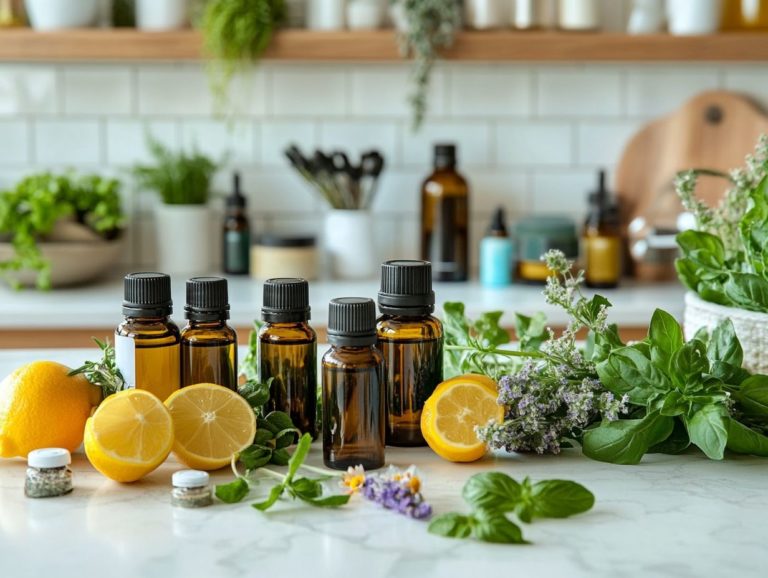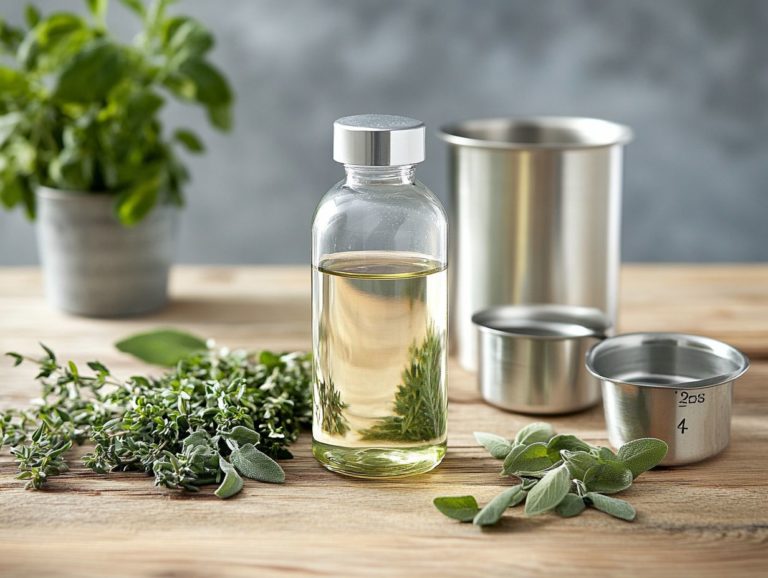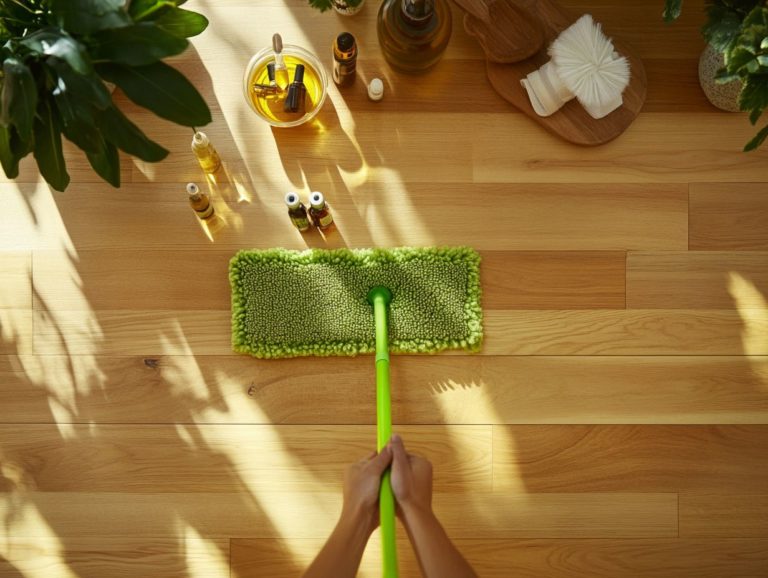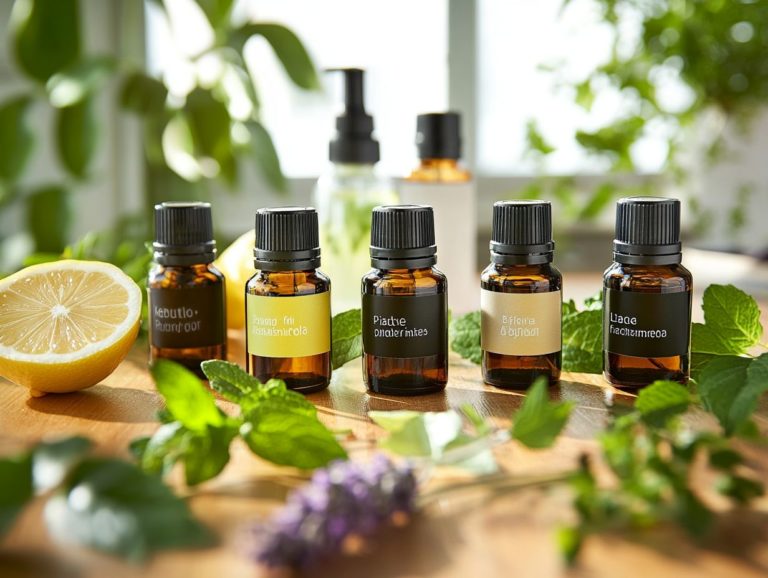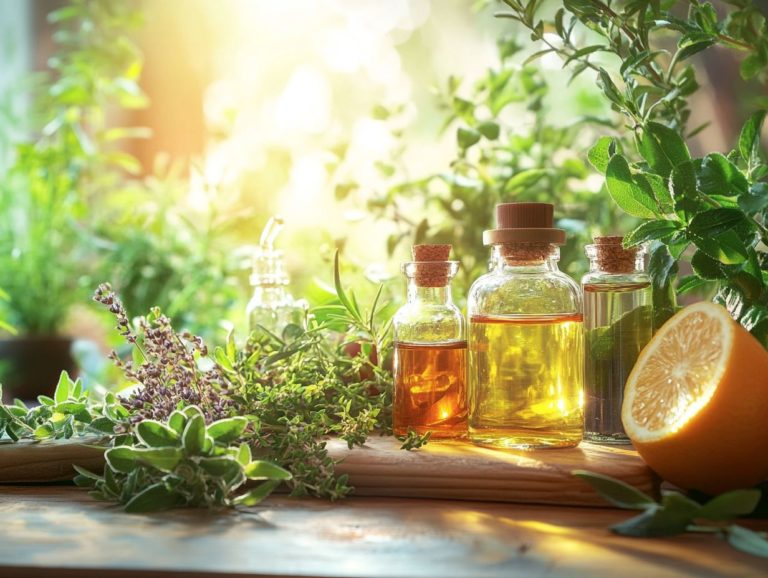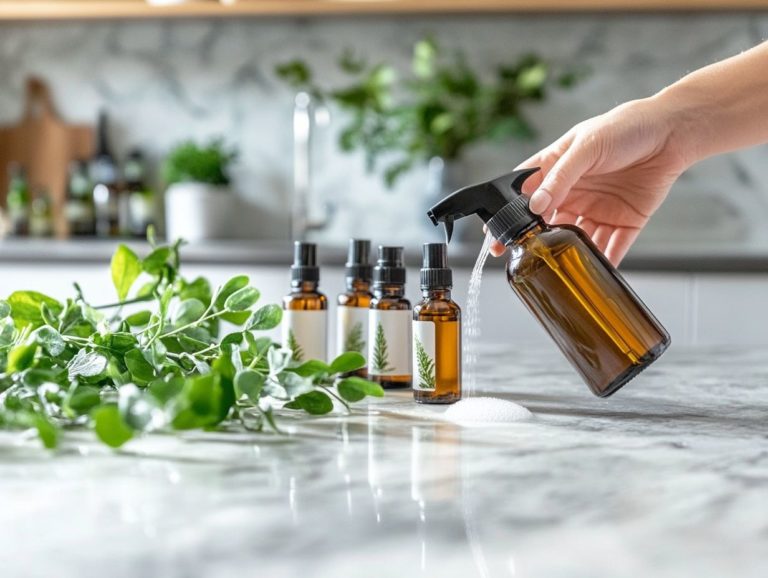Essential Oils: Nature’s Best Cleaning Agents
Essential oils have surged in popularity, not only for their delightful aromas but also for their impressive cleaning capabilities and essential oil benefits.
In this article, you will explore what essential oils are and how they are crafted. You’ll uncover their many benefits, including their non-toxic nature and powerful antimicrobial properties. You ll also discover the best essential oils tailored for various cleaning tasks and learn about their aromatic properties. These oils can be used in natural cleaning products to enhance your home environment.
You’ll also get tips on using these oils safely and effectively at home. Get ready to transform your cleaning routine with the amazing power of nature, incorporating household cleaners like tea tree and eucalyptus oils into your regimen.
Contents
- Key Takeaways:
- What Are Essential Oils?
- How Are Essential Oils Made?
- What Are the Benefits of Using Essential Oils for Cleaning?
- What Are the Best Essential Oils for Cleaning?
- How to Use Essential Oils for Cleaning?
- Safety Precautions and Considerations
- Frequently Asked Questions
- What are essential oils?
- What are ways to clean with essential oils?
- What are some of the best essential oils for cleaning?
- Can essential oils replace traditional cleaning products?
- How do I use essential oils for cleaning?
- Are there any precautions I should take when using essential oils for cleaning?
Key Takeaways:
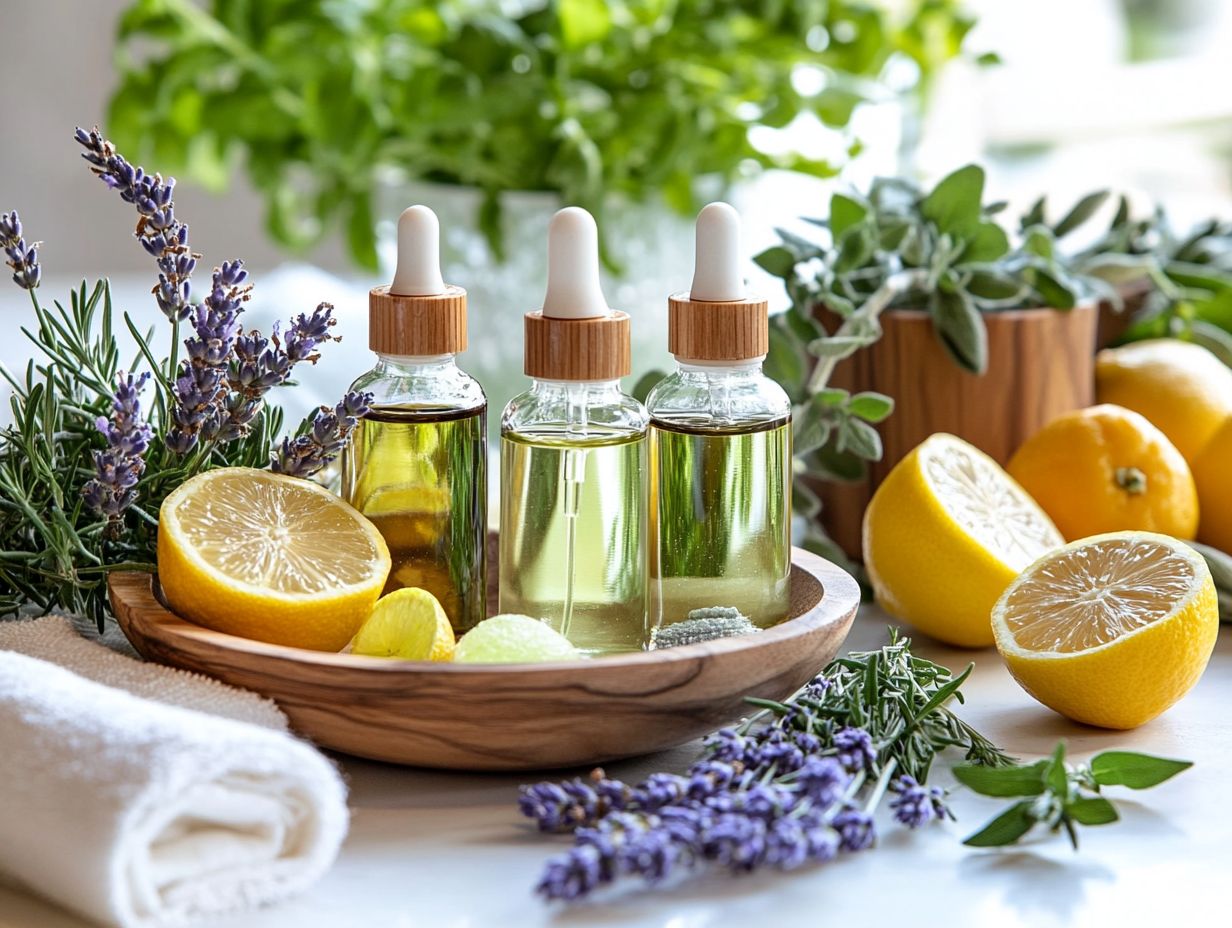
- Essential oils are natural, non-toxic, and eco-friendly, making them a safe option for families and pets.
- Many essential oils have antimicrobial properties, making them effective in killing germs and bacteria.
- Essential oils not only clean but also leave a pleasant aroma, making your space smell fresh and inviting.
What Are Essential Oils?
Essential oils are remarkably concentrated extracts from plants that encapsulate the aromatic qualities and beneficial compounds of a wide array of botanicals, including herbs, flowers, and fruits such as basil, rosemary, and clove. These natural wonders are obtained through detailed steps like steam distillation (a method using steam to extract oils from plants) and cold pressing, which meticulously preserve the distinctive traits of each plant.
In the United States, the allure of essential oils has soared, not just for their enchanting fragrances but also for their therapeutic benefits. These benefits range from enhancing skin care routines to providing natural remedies for anxiety relief. They significantly contribute to fostering a non-toxic environment within your home, allowing you to embrace a healthier lifestyle. Specific oils like peppermint, lavender, and lemon essential oils are particularly popular for their versatile applications.
How Are Essential Oils Made?
Extraction Methods
The production of essential oils involves detailed steps such as steam distillation and cold pressing, which expertly extract concentrated aromatic and therapeutic compounds from plant materials. These techniques ensure that the essence of the original botanicals is preserved, resulting in a pure and potent product with a myriad of applications, from natural cleaning solutions to skincare treatments and natural remedies to reduce anxiety.
Among these methods, steam distillation is the most commonly used. In this process, steam passes through the plant materials, releasing their volatile compounds, which are then cooled and condensed back into liquid form. Cold pressing, on the other hand, is primarily reserved for citrus oils like grapefruit, lemon, and wild orange, where the outer peels are mechanically pressed to release their fragrant oils.
Other extraction methods include solvent extraction and CO2 extraction, which provide alternatives tailored to different plant types and desired aromatic characteristics. These methods can be particularly useful for obtaining oils from more delicate botanicals like myrtle and carrot seed oil.
The importance of purity and quality in essential oils cannot be overstated; high-quality oils not only enhance therapeutic benefits but also ensure safety in their use. Choosing oils that are free from additives and contaminants is essential for achieving optimal efficacy. Therefore, it s crucial for you to select reputable brands and seek out third-party tested products to guarantee the best results. Notable essential oils like Melaleuca and Wild Orange are often highlighted for their purity and effectiveness.
Start exploring the world of essential oils today and discover how they can transform your home into a cleaner, fresher space!
What Are the Benefits of Using Essential Oils for Cleaning?
Utilizing essential oils for cleaning presents a wealth of benefits that revolutionize your approach to household chores. These natural cleaning solutions are effective and environmentally friendly. Oils like tea tree, eucalyptus, and lavender are especially favored for their potent cleaning properties.
These oils fight germs effectively and serve as formidable allies in creating a healthier immune system at home.
The advantages of essential oils extend beyond mere cleanliness. They create a non-toxic environment that ensures safety for your family and pets alike.
1. Natural and Non-Toxic
Tea tree oil and eucalyptus oil are among the most effective essential oils for maintaining a natural and non-toxic environment.
One primary advantage of incorporating essential oils into your cleaning routine is their natural and non-toxic characteristics. This provides a safer alternative to conventional household cleaners laden with harmful chemicals.
Essential oils like lemon and tea tree excel in disinfection and help create a healthier indoor environment, free from toxic substances. By embracing these powerful plant-based solutions, you can significantly reduce the toxic load typically present in your home.
Health issues, including respiratory problems and skin irritations, can arise from frequent exposure to synthetic chemicals.
Using essential oils not only ensures effective surface cleaning but also brings the added benefits of aromatherapy. You ll love how they uplift your mood and enhance mental clarity.
When you switch to these non-toxic cleaners, you make a conscious decision prioritizing both eco-friendliness and personal health. This results in a cleaner living space that aligns beautifully with a more sustainable lifestyle.
2. Antimicrobial Properties
Lavender oil and peppermint oil are well-known for their antimicrobial properties, making them great additions to your cleaning arsenal.
Essential oils are effective agents in your cleaning products and disinfectants, offering a natural alternative to harsh chemicals. Oils like eucalyptus and tea tree help inhibit the growth of bacteria, fungi, and viruses. For a deeper understanding of how these can be used, check out this introduction to essential oils for cleaning, ensuring a cleaner and safer environment for your family.
Incorporating these essential oils into your cleaning routine can significantly boost your effectiveness. For instance, lavender oil fills your space with delightful fragrance while providing soothing properties that can target certain pathogens.
Lemon oil, with its natural acidity, breaks down grease and serves as a powerful disinfectant. When combined with vinegar or baking soda, these essential oils enhance their cleaning power without compromising safety.
By choosing these natural alternatives, you can maintain a hygienic home while steering clear of toxic chemicals that could harm your indoor air quality.
3. Pleasant Aroma
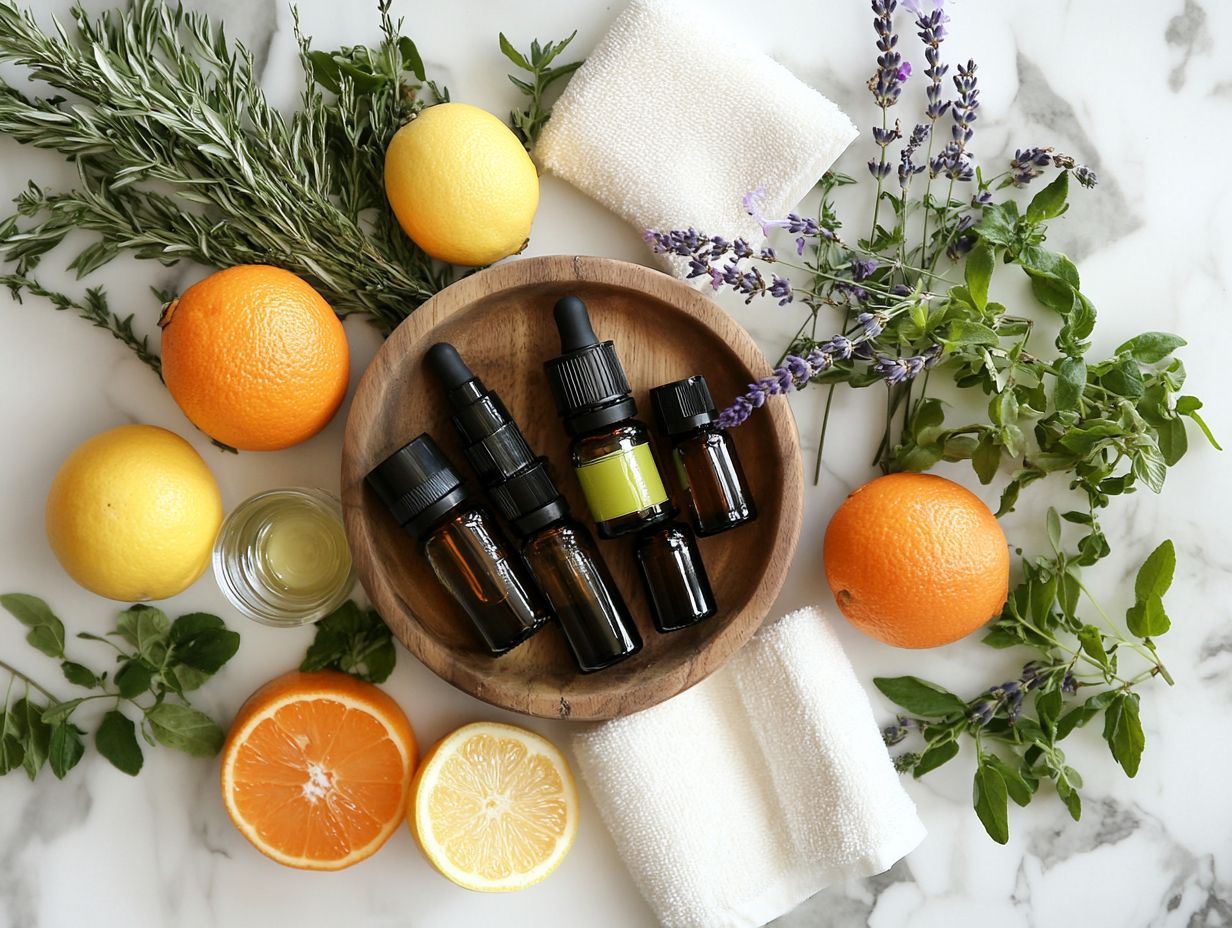
Using essential oils for cleaning guarantees a hygienic home while infusing your space with delightful aromas. These scents can elevate your mood and alleviate anxiety as you tackle household chores.
The aromatic properties of oils like lavender and peppermint create a calming atmosphere, transforming the cleaning experience into something enjoyable. Their antibacterial properties further enhance effectiveness.
Incorporating these natural scents can significantly enhance your overall mental well-being. For instance, eucalyptus oil acts as a powerful disinfectant and invigorates the mind, promoting clarity and renewed energy.
Citrus oils such as lemon and orange offer a refreshing zest, leaving your spaces feeling bright and stimulating.
Engaging your senses with these enchanting aromas transforms mundane cleaning sessions into uplifting rituals. This fosters a sense of tranquility and accomplishment, contributing to a more serene living environment.
4. Multi-Purpose Use
Essential oils like lemon and tea tree can be combined with common household ingredients like baking soda and white vinegar for versatile cleaning solutions.
Essential oils are incredibly versatile, serving as a cornerstone in the realm of natural cleaning within eco-friendly households. When you combine them with everyday ingredients like baking soda, white vinegar, or castile soap a natural soap made from vegetable oils these essential oils amplify the cleaning power of these natural agents. This provides effective results without the unwanted side effects of harsh chemicals.
For example, when you mix tea tree essential oil with white vinegar, you create a formidable disinfectant that effectively combats mold and mildew, making it especially valuable in bathrooms. Similarly, combining lemon essential oil with baking soda yields a delightful fresh-smelling scrub that effortlessly cleans countertops and sinks while cutting through grease. Castile soap can also be a valuable addition to these mixtures, further enhancing their cleaning power.
Lavender essential oil adds not only a soothing aroma but also antibacterial properties, making it a perfect enhancement for laundry detergents. These combinations provide effective cleaning solutions. They also contribute to a healthier living space free from toxins often found in conventional cleaners.
What Are the Best Essential Oils for Cleaning?
In addition to the popular choices, consider oils like clove and cinnamon for their strong germ-fighting abilities.
When it comes to cleaning, some essential oils stand out as top performers for their remarkable effectiveness and enchanting fragrances, positioning them as the perfect choice for natural cleaning products. For a deeper dive, check out essential oils for cleaning like lemon, tea tree, lavender, and peppermint which offer robust antibacterial properties while simultaneously enveloping your spaces in delightful aromas.
This transforms your cleaning routine into a sensory experience that elevates even the most mundane chores.
1. Lemon Essential Oil
Consider pairing it with other oils like grapefruit or orange for a citrusy cleaning boost.
Lemon essential oil stands out as a premium choice for your cleaning endeavors, thanks to its remarkable antibacterial properties and invigorating scent. It seamlessly elevates any natural cleaning routine, effectively banishing bacteria while leaving surfaces infused with a fresh, uplifting fragrance.
When you incorporate lemon essential oil into your cleaning products, you’re not just purifying; you’re also unleashing a powerful natural degreaser that effortlessly cuts through grime in your kitchens and bathrooms. It stands out among household cleaners for its aromatic properties and natural cleaning power.
Unlock its full potential now to make your cleaning effortless! Consider adding a few drops to your homemade floor cleaners or mixing it into spray bottles filled with water and white vinegar. This combination offers a potent yet eco-friendly solution that s hard to beat. Blending lemon essential oil with baking soda enhances its cleaning power.
Beyond its cleaning prowess, the bright aroma of lemon essential oil has the delightful ability to uplift your mood, transforming what could be a mundane chore into a more enjoyable experience.
For those seeking to enhance their cleaning efficiency, utilizing lemon essential oil is a simple yet effective strategy for achieving a clean, healthy environment. Furthermore, the various essential oil benefits can contribute to a non-toxic environment in your home.
2. Tea Tree Essential Oil (Melaleuca)
Renowned for its strong abilities to fight germs and bacteria, tea tree essential oil is a critical addition to your natural cleaning arsenal. Commonly referred to as Melaleuca, it serves as one of the most versatile natural remedies for cleaning.
It effectively combats bacteria, mold, and mildew, making it an ideal choice for sanitizing surfaces and fostering a healthy home environment.
Act now to freshen your home and protect your loved ones from harmful germs! When you incorporate tea tree essential oil into your homemade cleaning solutions, you can effectively target common household pathogens like E. coli and Staphylococcus aureus, ensuring that your kitchen counters and bathroom surfaces remain free from harmful bacteria.
Its efficacy against fungi also makes it a smart option for addressing damp areas prone to mold growth, such as tiles and grout.
By utilizing tea tree oil in your spray cleaners or as an additive in your laundry, you not only refresh your living space but also cultivate a safer atmosphere for your family. The antibacterial properties extend to household fabrics and surfaces, ensuring a comprehensive clean.
Its versatility as a natural cleaning agent truly shines in your efforts to maintain a pristine home. Adding tea tree oil to your cleaning regimen supports your immune system by reducing potential allergens and pathogens.
3. Lavender Essential Oil (Lavandula)
Lavender essential oil is not just beloved for its delightful aroma; it s also renowned for its calming effects, making it an excellent addition to your cleaning products. This essential oil is commonly incorporated into skin care products due to its soothing properties.
The soothing scent can help alleviate anxiety while effectively disinfecting surfaces, creating a serene and harmonious home environment. Its ability to reduce anxiety also enhances your overall sense of well-being.
By incorporating lavender essential oil into your cleaning routines, you have the power to transform mundane chores into enjoyable tasks. For example, adding a few drops of lavender oil to your homemade all-purpose cleaner can enhance its effectiveness while leaving behind a refreshing fragrance.
Using lavender-infused cleaning wipes or sprays not only promotes a pristine home but also cultivates a sense of well-being among your family members. Lavender oil can also be paired with other essential oils like grapefruit or rosemary for enriched aromatic properties.
Try using a diffuser with lavender oil during your cleaning sessions for an instant mood boost! This approach not only energizes the cleaning process but also diminishes stress, making everyday maintenance feel less like a chore and more like a moment of self-care.
Essential oils like lavender, basil, and chamomile can transform your cleaning routine into a therapeutic experience.
4. Peppermint Essential Oil (Mentha piperita)
Peppermint essential oil is your ticket to a refreshing scent and remarkable antibacterial properties, making it a superior choice for your natural cleaning endeavors. This essential oil also features prominently in natural remedies for its invigorating qualities.
Its invigorating aroma doesn t just smell amazing; it can also uplift your mood and boost your energy levels while providing effective solutions for all your household cleaning tasks. Moreover, peppermint oil offers benefits that extend beyond cleaning, contributing to enhanced emotional well-being.
This versatile oil serves as a natural disinfectant and leaves your surfaces smelling delightful. Combining it with eucalyptus oil in your cleaning solutions can amplify its antibacterial properties.
If you’re determined to tackle grime and odors, integrating peppermint essential oil into your homemade cleaners can truly elevate your cleaning routine.
Just a few drops mixed with vinegar or baking soda create a powerful solution that cuts through grease and banishes unwanted smells. The refreshing fragrance can enhance your sense of well-being and alertness, transforming those mundane cleaning chores into a more enjoyable experience.
Whether you re sprucing up the kitchen, bathroom, or living areas, this essential oil proves to be an invaluable ally in your quest for a clean and aromatic environment. The essential oil benefits also extend to supporting a safe cleaning approach for your family and pets.
How to Use Essential Oils for Cleaning?
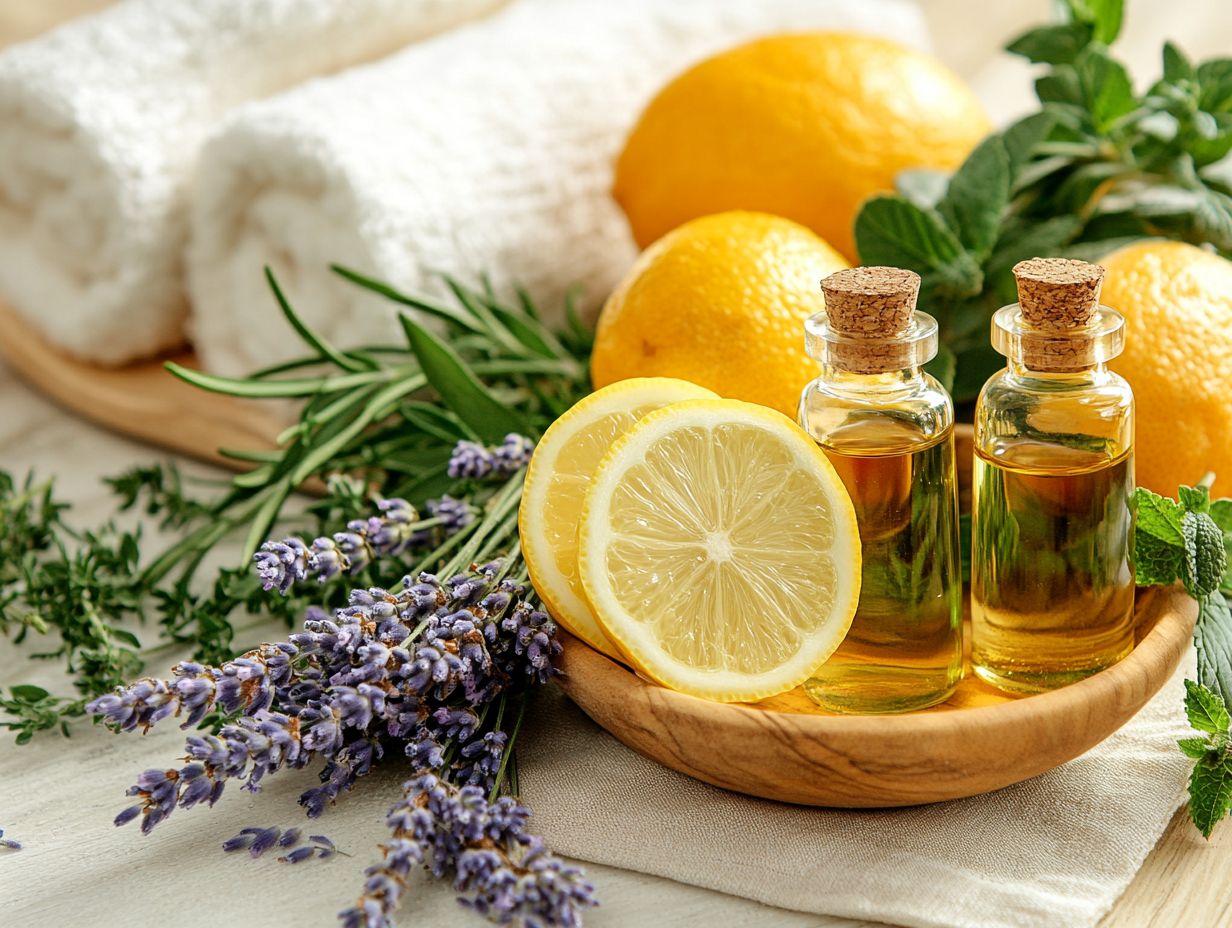
Essential oils are not just for aromatherapy; they can also be powerful allies in cleaning. Utilizing essential oils for cleaning includes different methods, such as dilution, mixing, surface application, and even diffusing, each presenting distinct advantages for creating a clean and aromatic home environment.
By grasping the best practices for employing these oils, you can fully leverage their potential in your cleaning regimen, all while ensuring safety and effectiveness.
1. Dilution and Mixing
Proper dilution and mixing of essential oils are essential for creating effective and safe cleaning solutions. This method guarantees that the oils maintain their potency while minimizing any potential irritation. A good rule of thumb for most cleaning applications is to combine essential oils with a carrier a substance that helps mix essential oils with other liquids such as water, white vinegar, or castile soap to enhance their cleaning efficacy.
This method guarantees that the essential oils are evenly distributed while also reducing the risks associated with applying them directly to surfaces or skin. For example, when crafting a multipurpose cleaner, consider adding 10-20 drops of essential oil like tea tree or lemon to a cup of water and a cup of vinegar.
For tougher cleaning tasks, such as scrubbing pots or surfaces, you might want to use 30 drops mixed with a quart of water for impressive results. Always remember to test a small area first, as some essential oils can react differently with various materials. Popular choices include Eucalyptus Oil and Wild Orange for their cleansing and aromatic properties.
2. Surface Application (Sherry’s Tips)
Surface application of essential oils is an elegant and straightforward way to harness their cleaning benefits in your home. This allows you to focus on specific areas that need disinfection or a refreshing lift. The aromatic properties of essential oils like lavender and eucalyptus can enhance your home’s ambiance.
By applying a diluted solution of essential oils to surfaces, you re not just cleaning; you re enriching the space with delightful fragrances that elevate the atmosphere. This approach shines particularly bright when combined with oils that boast natural antibacterial and antifungal properties. Incorporating oils like clove or cinnamon can further augment the disinfectant power.
For hard surfaces like countertops and tables, reach for oils such as tea tree, lemon, or eucalyptus; their cleansing prowess makes them excellent choices. These oils are also beneficial for creating a non-toxic cleaning solution.
Regarding upholstery or carpets, consider indulging in lavender or chamomile essential oils, which not only impart a pleasant aroma but also work to reduce allergens and bacteria. Oils like carrot seed oil and myrtle oil can be excellent additions for their subtle scents and gentle properties.
Always conduct a quick patch test to ensure your surfaces are safe before use, ensuring compatibility and preventing potential damage. Understand each oil’s unique characteristics to transform your cleaning routine into a holistic and aromatic experience that refreshes both your space and your spirit.
Try incorporating essential oils into your cleaning routine today and experience the difference!
3. Diffusing Essential Oils
Diffusing essential oils is a remarkable way to elevate your cleaning routine. As you purify the air, you also create a delightful aroma that can soothe anxiety and uplift your mood. Picture this: using a diffuser to spread calming lavender or zesty lemon throughout your home, enveloping yourself in a therapeutic and fragrant experience.
This method not only tackles odors and airborne pathogens but also fosters a tranquil atmosphere that encourages relaxation and focus. You can choose from various diffusion methods candle diffusers, ultrasonic devices, or even heat-based options each offering a unique intensity of aroma. Methods like these are particularly effective in spreading the benefits of lavender oil, lemon essential oil, or peppermint oil.
To truly enjoy the full benefits, it’s vital to select high-quality, pure essential oils.
Some popular choices you might consider include:
- Eucalyptus, known for its refreshing scent and antimicrobial properties
- Tea tree oil, celebrated for its purifying effects
- Peppermint, with its invigorating aroma
- wild orange, offering a bright and uplifting fragrance
- lavender oil, for a calming atmosphere
By establishing a routine of diffusing essential oils, you can significantly enhance your emotional wellbeing and cultivate a healthier living environment.
Safety Precautions and Considerations
While essential oils bring a wealth of benefits for your cleaning routine, it’s crucial to adhere to safety precautions to ensure their effective and safe use in your home.
Proper dilution is key to preventing skin irritation, and you should always avoid direct contact with your eyes or skin, especially when working with potent oils. Moreover, keeping essential oils out of reach of children and pets is essential for maintaining a safe and harmonious environment.
By following these guidelines, you can fully enjoy the advantages of essential oils while prioritizing safety. The United States has specific guidelines on the safe use of essential oils, so always consult local regulations.
1. Proper Dilution
Proper dilution of essential oils is essential in the cleaning process, as it maximizes their effectiveness while minimizing the risk of irritation or adverse reactions. A well-diluted essential oil solution guarantees a safe and effective cleaning experience, all without sacrificing the natural benefits these oils offer.
To achieve this, you should carefully consider the type of oil you re using and its intended application. For general cleaning purposes, a common guideline is to mix 10-20 drops of essential oil per cup of water. However, for more potent scents like tea tree or eucalyptus, you ll want to dial it back to just 5-10 drops.
Regarding surface disinfecting, a ratio of 1 part essential oil to 10 parts water will create a powerful natural cleaning solution. Oils like lemon or orange not only uplift the ambiance but also add antibacterial properties, making them perfect for kitchen surfaces. Combining these oils with household cleaners like baking soda, white vinegar, or castile soap can enhance their efficacy.
The key lies in ensuring that you blend the oils well and store them properly to maintain their efficacy. Additionally, the essential oil benefits include creating a non-toxic environment and supporting your immune system.
2. Avoiding Contact with Eyes and Skin
To ensure your safety while using essential oils for cleaning, it s crucial to take the necessary precautions to avoid contact with your eyes and skin, as some oils may cause irritation or allergic reactions. By implementing careful application techniques and utilizing diluted solutions, you can effectively mitigate these risks.
Using a carrier oil, such as coconut or almond oil, when applying essential oils not only enhances safety but also offers additional benefits, like moisturizing your skin and providing skin care solutions to reduce anxiety.
Creating a safe environment means keeping essential oils out of reach of children and pets to minimize risks and ensure a non-toxic environment. Wearing gloves while cleaning can provide an extra layer of protection against potential skin sensitivities.
Always conduct a patch test before widespread use, and don t forget to ventilate the area by opening windows, ensuring that your cleaning process remains both effective and safe.
3. Keeping Away from Children and Pets
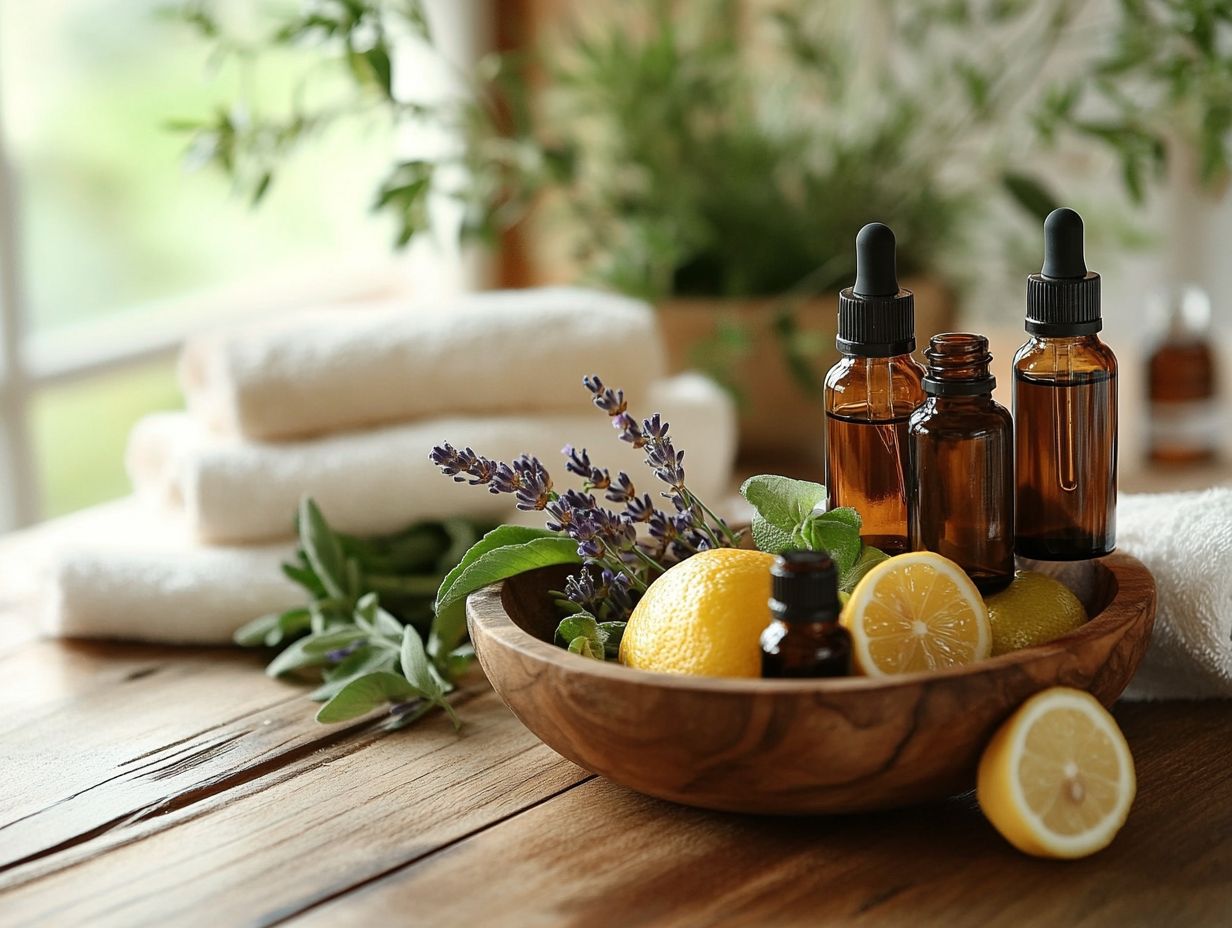
Protect your little ones and pets by keeping essential oils out of reach! Some oils can be harmful if swallowed or used incorrectly. By storing essential oils in secure locations and using them thoughtfully, you can maintain a safe environment for everyone in your home.
If you re eager to explore the world of these fragrant oils, take the time to familiarize yourself with safe application methods. Understand various essential oils like lavender, tea tree, eucalyptus, lemon, grapefruit, basil, rosemary, clove, cinnamon, Melaleuca, Wild Orange, carrot seed oil, and myrtle oil. Consider using a diffuser placed out of reach or opt for child-proof personal inhalers that keep your little ones safe.
Always remember to dilute oils with a carrier oil before applying them to the skin to reduce the risk of irritation. Essential oils such as myrtle oil and carrot seed oil can be particularly beneficial when properly diluted. It’s essential to teach older children about the risks of essential oils to keep everyone safe!
By implementing these precautions, you can enjoy all the benefits that essential oils have to offer while ensuring the safety of your children and pets. Stay informed and proactive!
Frequently Asked Questions
What are essential oils?
Essential oils are natural, highly concentrated plant extracts made from plants and are very strong. They are often used for their therapeutic and cleaning properties, with notable aromatic benefits.
What are ways to clean with essential oils?
Essential oils have powerful antimicrobial and antibacterial properties that make them effective at cleaning and disinfecting surfaces in your home, offering a natural remedy to traditional cleaning methods.
What are some of the best essential oils for cleaning?
Some of the most effective essential oils for cleaning are lemon, lavender, tea tree, eucalyptus, and peppermint. Lemon essential oil and tea tree oil are particularly well-known for their antimicrobial properties.
Can essential oils replace traditional cleaning products?
Yes, essential oils can be used as a natural alternative to traditional cleaning products that may contain harsh chemicals. They are safe for you and your family, as well as the environment, promoting a healthier household cleaning routine.
How do I use essential oils for cleaning?
Essential oils can be used in a variety of ways for cleaning, such as adding a few drops to your homemade cleaning solutions, using them in a diffuser to freshen the air, or adding a few drops to your laundry detergent. Combining essential oils with traditional cleaning agents like baking soda and white vinegar can enhance their cleaning power.
Are there any precautions I should take when using essential oils for cleaning?
Yes, essential oils are highly concentrated and should always be diluted before use. Be sure to keep them out of reach of children and pets, and avoid using them on sensitive surfaces or fabrics without testing a small area first. Understanding the properties of each oil helps you use them effectively, such as the antimicrobial properties of tea tree oil or the soothing effects of lavender oil.

